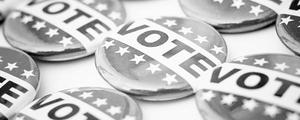Story Highlights
- 70% of Democrats, 67% of Republicans have thought a lot about election
- Republicans typically have an advantage
- Large age, racial, educational gaps in election thought are evident
WASHINGTON, D.C. -- A year before the 2020 presidential election, roughly seven in 10 Democrats and Republicans say they have given "quite a lot of thought" to the election. About half of political independents have done so.
| Quite a lot | Some (vol.) | Very little | None (vol.) | ||||||||||||||||||||||||||||||||||||||||||||||||||||||||||||||||||||||||||||||||||||||||||||||||
|---|---|---|---|---|---|---|---|---|---|---|---|---|---|---|---|---|---|---|---|---|---|---|---|---|---|---|---|---|---|---|---|---|---|---|---|---|---|---|---|---|---|---|---|---|---|---|---|---|---|---|---|---|---|---|---|---|---|---|---|---|---|---|---|---|---|---|---|---|---|---|---|---|---|---|---|---|---|---|---|---|---|---|---|---|---|---|---|---|---|---|---|---|---|---|---|---|---|---|---|
| % | % | % | % | ||||||||||||||||||||||||||||||||||||||||||||||||||||||||||||||||||||||||||||||||||||||||||||||||
| U.S. adults | 60 | 2 | 35 | 3 | |||||||||||||||||||||||||||||||||||||||||||||||||||||||||||||||||||||||||||||||||||||||||||||||
| Republicans | 67 | 1 | 29 | 2 | |||||||||||||||||||||||||||||||||||||||||||||||||||||||||||||||||||||||||||||||||||||||||||||||
| Democrats | 70 | 2 | 27 | 1 | |||||||||||||||||||||||||||||||||||||||||||||||||||||||||||||||||||||||||||||||||||||||||||||||
| Independents | 50 | 3 | 42 | 4 | |||||||||||||||||||||||||||||||||||||||||||||||||||||||||||||||||||||||||||||||||||||||||||||||
| Combined data from Aug. 15-31 and Sept. 16-30, 2019, surveys.; (vol.) = volunteered response | |||||||||||||||||||||||||||||||||||||||||||||||||||||||||||||||||||||||||||||||||||||||||||||||||||
| Gallup | |||||||||||||||||||||||||||||||||||||||||||||||||||||||||||||||||||||||||||||||||||||||||||||||||||
The lack of a Republican-Democratic difference in thought given to the election is notable because Republicans usually have an advantage over Democrats, including in each of the past seven final presidential pre-election surveys, as well as in most surveys conducted throughout presidential election years historically.
The current results are based on combined data from interviews with more than 2,400 U.S. adults aged 18 and older, conducted between Aug. 15 and Sept. 30, 2019.
Gallup has measured thought given to the election since 1952, and it has shown a relationship to actual voter turnout among all Americans in past elections. When more Americans are thinking about the election, more Americans tend to vote.
Current Level of Thought Among All Americans Exceeds Past Measurements
Compared with past measures at similar points in time, these data indicate that 2020 may be a high turnout year. The Gallup "thought" question has been asked in the year before a presidential election on only a few occasions, including 1979, 1999 and 2007. However, the 60% of all U.S. adults engaged in the presidential campaign at this time exceeds the percentages measured in any of those years, with the late 2007 measure (55%) the closest.
The current level of voter engagement also surpasses many historical election-year measures, particularly those before 2004.
Racial, Age, Education Gaps in Voter Thought
The lack of party differences in thought given to the election is atypical, but other subgroup differences apparent in the 2019 data are consistent with the past. For example:
- Non-Hispanic whites are much more likely than blacks and Hispanics to be giving a lot of thought to the election.
- Also, many more older adults than younger adults have thought a lot about the election. Barely more than four in 10 adults under age 30 have, compared with nearly three-quarters of those aged 65 and older.
- There are also wide gaps in election thought by educational attainment, with postgraduates among the most engaged subgroups and adults with no college education among the least.
- Suburban residents are modestly more likely than city or rural residents to be paying attention to the election.
| Quite a lot | ||||||||||||||||||||||||||||||||||||||||||||||||||||||||||||||||||||||||||||||||||||||||||||||||||||
|---|---|---|---|---|---|---|---|---|---|---|---|---|---|---|---|---|---|---|---|---|---|---|---|---|---|---|---|---|---|---|---|---|---|---|---|---|---|---|---|---|---|---|---|---|---|---|---|---|---|---|---|---|---|---|---|---|---|---|---|---|---|---|---|---|---|---|---|---|---|---|---|---|---|---|---|---|---|---|---|---|---|---|---|---|---|---|---|---|---|---|---|---|---|---|---|---|---|---|---|---|
| % | ||||||||||||||||||||||||||||||||||||||||||||||||||||||||||||||||||||||||||||||||||||||||||||||||||||
| Age | ||||||||||||||||||||||||||||||||||||||||||||||||||||||||||||||||||||||||||||||||||||||||||||||||||||
| 18-29 | 42 | |||||||||||||||||||||||||||||||||||||||||||||||||||||||||||||||||||||||||||||||||||||||||||||||||||
| 30-49 | 58 | |||||||||||||||||||||||||||||||||||||||||||||||||||||||||||||||||||||||||||||||||||||||||||||||||||
| 50-64 | 65 | |||||||||||||||||||||||||||||||||||||||||||||||||||||||||||||||||||||||||||||||||||||||||||||||||||
| 65+ | 74 | |||||||||||||||||||||||||||||||||||||||||||||||||||||||||||||||||||||||||||||||||||||||||||||||||||
| Race/Ethnicity | ||||||||||||||||||||||||||||||||||||||||||||||||||||||||||||||||||||||||||||||||||||||||||||||||||||
| Non-Hispanic white | 65 | |||||||||||||||||||||||||||||||||||||||||||||||||||||||||||||||||||||||||||||||||||||||||||||||||||
| Non-Hispanic black | 56 | |||||||||||||||||||||||||||||||||||||||||||||||||||||||||||||||||||||||||||||||||||||||||||||||||||
| Hispanic | 40 | |||||||||||||||||||||||||||||||||||||||||||||||||||||||||||||||||||||||||||||||||||||||||||||||||||
| Education | ||||||||||||||||||||||||||||||||||||||||||||||||||||||||||||||||||||||||||||||||||||||||||||||||||||
| High school or less | 49 | |||||||||||||||||||||||||||||||||||||||||||||||||||||||||||||||||||||||||||||||||||||||||||||||||||
| Some college | 60 | |||||||||||||||||||||||||||||||||||||||||||||||||||||||||||||||||||||||||||||||||||||||||||||||||||
| College graduate only | 67 | |||||||||||||||||||||||||||||||||||||||||||||||||||||||||||||||||||||||||||||||||||||||||||||||||||
| Postgraduate | 78 | |||||||||||||||||||||||||||||||||||||||||||||||||||||||||||||||||||||||||||||||||||||||||||||||||||
| Place of residence | ||||||||||||||||||||||||||||||||||||||||||||||||||||||||||||||||||||||||||||||||||||||||||||||||||||
| Big/Small city | 56 | |||||||||||||||||||||||||||||||||||||||||||||||||||||||||||||||||||||||||||||||||||||||||||||||||||
| Suburb of big/small city | 66 | |||||||||||||||||||||||||||||||||||||||||||||||||||||||||||||||||||||||||||||||||||||||||||||||||||
| Town/Rural area | 61 | |||||||||||||||||||||||||||||||||||||||||||||||||||||||||||||||||||||||||||||||||||||||||||||||||||
| Combined data from Aug. 15-31 and Sept. 16-30, 2019, surveys | ||||||||||||||||||||||||||||||||||||||||||||||||||||||||||||||||||||||||||||||||||||||||||||||||||||
| Gallup | ||||||||||||||||||||||||||||||||||||||||||||||||||||||||||||||||||||||||||||||||||||||||||||||||||||
The data show no difference in election attention by gender or by church attendance.
While Republicans and Democrats overall don't differ in their level of attention, there is variation within party subgroups by ideology. Specifically, Americans on the poles of the political spectrum -- liberal Democrats (including Democratic-leaning independents) and conservative Republicans (including Republican-leaning independents) -- are the most likely to be thinking a lot about the upcoming election. Moderate and conservative Democrats, as well as liberal or moderate Republicans, are considerably less likely to be engaged in the election at this point. Non-leaning independents -- a largely apolitical group -- are least likely to be thinking about the election.
| Quite a lot | |||||||||||||||||||||||||||||||||||||||||||||||||||||||||||||||||||||||||||||||||||||||||||||||||||
|---|---|---|---|---|---|---|---|---|---|---|---|---|---|---|---|---|---|---|---|---|---|---|---|---|---|---|---|---|---|---|---|---|---|---|---|---|---|---|---|---|---|---|---|---|---|---|---|---|---|---|---|---|---|---|---|---|---|---|---|---|---|---|---|---|---|---|---|---|---|---|---|---|---|---|---|---|---|---|---|---|---|---|---|---|---|---|---|---|---|---|---|---|---|---|---|---|---|---|---|
| % | |||||||||||||||||||||||||||||||||||||||||||||||||||||||||||||||||||||||||||||||||||||||||||||||||||
| Liberal Democrat/Democratic leaner | 76 | ||||||||||||||||||||||||||||||||||||||||||||||||||||||||||||||||||||||||||||||||||||||||||||||||||
| Moderate Democrat/Democratic leaner | 62 | ||||||||||||||||||||||||||||||||||||||||||||||||||||||||||||||||||||||||||||||||||||||||||||||||||
| Conservative Democrat/Democratic leaner | 42 | ||||||||||||||||||||||||||||||||||||||||||||||||||||||||||||||||||||||||||||||||||||||||||||||||||
| Non-leaning independent | 31 | ||||||||||||||||||||||||||||||||||||||||||||||||||||||||||||||||||||||||||||||||||||||||||||||||||
| Liberal/Moderate Republican/Republican leaner | 48 | ||||||||||||||||||||||||||||||||||||||||||||||||||||||||||||||||||||||||||||||||||||||||||||||||||
| Conservative Republican/Republican leaner | 70 | ||||||||||||||||||||||||||||||||||||||||||||||||||||||||||||||||||||||||||||||||||||||||||||||||||
| Combined data from Aug. 15-31 and Sept. 16-30, 2019, surveys | |||||||||||||||||||||||||||||||||||||||||||||||||||||||||||||||||||||||||||||||||||||||||||||||||||
| Gallup | |||||||||||||||||||||||||||||||||||||||||||||||||||||||||||||||||||||||||||||||||||||||||||||||||||
Implications
Democratic parity with Republicans on election thought -- as is the case now -- is uncommon. To some degree, that could reflect the fact that Democrats have a competitive nomination contest underway to choose an opponent for Donald Trump. Once the general election campaign gets underway, a Republican advantage could emerge later in the campaign as Republican attention ramps up.
However, Democrats' staunch opposition to Trump may have ushered in an era when politics is as top-of-mind for Democrats as it is for Republicans. Democrats had a significant lead over Republicans in election thought at the time of the 2018 midterm elections, and they made major gains in congressional and state elections that year. That is the only presidential or midterm election year since 1992 when Democrats were more engaged than Republicans at the time of the election.
And while some traditionally Democratic groups -- such as young adults or racial minorities -- remain relatively uninvolved in the election, enough other Democrats are paying attention to suggest the party and, by extension, the nation as a whole could be looking at strong voter participation in next year's election.
View complete question responses and trends.
Learn more about how the Gallup Poll Social Series works.




